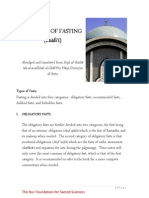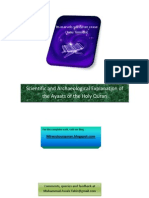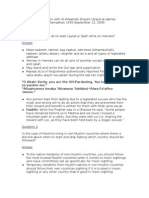A Brief About Fasting
A Brief About Fasting
Uploaded by
Islamic DocumentsCopyright:
Available Formats
A Brief About Fasting
A Brief About Fasting
Uploaded by
Islamic DocumentsOriginal Description:
Copyright
Available Formats
Share this document
Did you find this document useful?
Is this content inappropriate?
Copyright:
Available Formats
A Brief About Fasting
A Brief About Fasting
Uploaded by
Islamic DocumentsCopyright:
Available Formats
Home About Us Contact Us Advanced Recitations Main Articles A Brief about Fasting New Lessons Authors Fatawa Articles
Books Videos Sisters
Sign up Search in Islamway Special Files
Sign in
More
Categories
Tweet
Related Entries Only to our young girls in Ramadan Violations of women during fasting Among the signs of making things easy in Ramadan The Virtue of Fasting Six Days in the Month of Shawwl The Expecting Woman in Ramadan Scholar Related Rulings on Ramadan for Women Slacking in acts of worship during Ramadan
A Brief about Fasting
Muhammad Bin Salih Al-Uthaimeen
Category: Fiqh of Fasting Source: Publication Date: 8 Muharram 1434 (11/22/12)
Views Count:
71
This is a brief about fasting, its ruling, types of people in fasting, factors that break one's fasting and other benefits in brief.
All praise to Allah, Lord of the Realms Prayers and peace be upon our Prophet Muhammad and Upon all his family and companions. This is a brief about fasting, its ruling, types of people in fasting, factors that break one's fasting and other benefits in brief. Fasting means worshipping Allah by abstaining from eating and drinking from dawn until sun set. Fasting Ramadan: is one of the greatest pillars of Islam. The Prophet, prayers and peace be upon him, said: Islam is based on five (pillars): Testifying that there is none has the right to be worshipped but Allah, that Muhammad is His Slave and Messenger; and the establishment of prayer; and the payment of Zakah [poordue] and the Pilgrimage to the sacred House of Allah (Kabah) and to fast Ramadan. [Agreed upon]
The Method of Umrah The Virtue of the Ten Days of Dhul-Hijjah Women's role in society's reform New Articles The Muslim Home 40 recommendations
Muhammad Salih AlMunajjid
Giving Sincere Advice
Islamweb
A Too-Narrow View of Religiousness The health benefits of yogurt The Inner Secrets of Fasting
: Types of People in fasting: 1. Fasting is obligatory on every adult, sane, able, and resident Muslim. 2. An infidel is not under the obligation to fast and if they revert to Islam, they do not have to make up the fasts during their days of their disbelief. 3. A child that didnt reach puberty do not have to fast but they might be asked to fast only to get used to it.
converted by Web2PDFConvert.com
4. Insane or mentally deranged individuals do not have to fast or to feed others on his behalf as a substitute for not fasting even if they are adults. 5. The individuals who are unable to fast because of permanent causes such as old men or those inflicted with a disease they do not expect to recover from, have to feed a poor person for every day in Ramadan. 6. The individuals who suffer from a disease they expect to recover from, may break their fast if they find fasting a burden and make up the missed days after they recover. 7. If the pregnant and breastfeeding woman who find it hard to fast because of pregnancy or breastfeeding, or they fear their babies shall be in harm, they may break their fast and fast the missed days when they find it easy or there is no fear. 8. The one who is compelled to break his fast to save someone from drowning or from fire, may break his fast, and make up this day later on. 9. Women in menstrual or in postpartum period are not allowed to fast during this period, they must break their fast and fast the missed days later. 10. Travelers may fast or break their fast but they have to fast the missed days later whether their travel is temporary like traveling for Umra or permanent like taxi drivers, they may break their fast when they travel to cities other than their city.
Things that break one's fasting Persons' fasting is not broken if they do one of the things which break their fast, while they are ignorant or forgetting. Allah Almighty, says: Our Lord, do not impose blame upon us if we have forgotten or erred. [Al- Baqarah 2:286]
{... ...} 286 :
Transliteration: rabbana la tuakhithna in naseena aw akhtana
Allah, the All Mighty, says: "except for one who is forced [to renounce his religion] while his heart is secure in faith." [Al Nahal 16:106]
{ } 106 :
Transliteration: illa man okriha waqalbuhu mutmainnun bialeemani
His saying: " And there is no blame upon you for that in which you have erred but [only for]
converted by Web2PDFConvert.com
what your hearts intended." [Al-Ahzab 33:5]
{... ...} 5 :
Transliteration: walaysa AAalaykum junahun feema akhtatum bihi walakin ma
taAAammadat quloobukum If the fasting person eats or drinks forgetting, or if he eats thinking that, the sun has set or the dawn has not broken, his fasting will not be nullified because he is ignorant of the incidence. If the fasting person rinses his mouth with water and it accidently reaches his throat, his fasting will not be nullified, because he did not do this deliberately. If he discharged semen (wet dreaming) unintentionally while he was sleeping, his fasting will not be nullified.
The eight factors that break one's fast: 1. Sexual Intercourse: If a fasting person who is obliged to fast makes a sexual intercourse in the day of Ramadan; he has to fast another day as a substitute and make a great expiation, that is to free a slave, if one is not able to do that, he has two fast two successive months, if he is not able to do that, he has to feed sixty poor men. 2 . Discharge of semen while one is awake, through masturbation, or by approaching women, kissing, hugging, or the like. 3. Eating or drinking whether it is benefiting or harming such as smoking. 4. Nourishing injections, which substitute food and drink. But non nourishing injections do not break one's fasting whether they are used in veins or in muscles and whether one finds their taste in his throat or not. 5 . Blood transfer such as when the fasting person bleed and are given blood transfer to substitute the blood they lost. 6. The discharge of menstrual or postpartum blood. 7. Extracting blood by cupping and the like but if blood emerges naturally such as bleeding or coming out with the pulling out of teeth do not break one's fasting because its not cupping nor constitutes a part of it. 8. Vomiting deliberately, but if one vomit unintentionally his fasting is not nullified.
Notes: 1. Fasting persons may intend to fast even if they are in a state of major ritual impurity then they may wash after the crack of dawn.
converted by Web2PDFConvert.com
2. If a womans menstrual or postpartum period ends before Fajr in Ramadan, she must fast this day even if she washes after the crack of dawn. 3. The fasting persons may pull out their teeth or molars, cure their wounds or dropping in one's eyes or ears even if one finds the taste in his throat. 4 . Fasting individuals may use Siwak (tooth-cleansing stick) at the beginning or end of Ramadan days as it is Sunnah while fasting or not. 5. Fasting individuals may use things that relieve the severe hot weather or thirst such as pouring water on the body to cool down or using air conditions. 6 . Fasting individuals may spray (oral inhaler) in their mouth what lightens the breath shortage resulting from pressure or others. 7. Fasting individuals may damp their lips with water if they get dry and rinse their mouth with water, if their lips are dry, but not to swallow the water. 8. The Sunnah is to delay Suhur (pre-dawn meal) before the fast to make it directly before dawn and to break his fast quickly as soon as the sun sets, to breakfast on ripe dates, if one does not find then on dry dates, he may break his fast on water or on any permissible food. If he finds nothing, he only has to intend to break his fast till he finds anything to do so. 9 . The Sunnah for a fasting person is to make many good deeds and abstain from all prohibitions. 10. The fasting persons have to stick to obligations and abstain from prohibitions. They have to perform the five daily prayers in a congregation on time if they have no excuse to perform prayers individually. They have to give up lying, gossip and backbiting, cheating, all usury transactions and every prohibited saying or deed. Narrated Abu Huraira: The Prophet said, "Whoever does not give up forged speech and acting upon it, Allah is not in need of his leaving his food and drink (i.e. Allah will not accept his fasting.)" [Reported by Al-Bukhari]
All praise to Allah, Lord of the Realms Prayers and peace be upon our Prophet Muhammad and Upon all his family and companions. Written by: Muhammad Ibn Saleh Al-Othaymeen
Translated by Wathakker.info website
converted by Web2PDFConvert.com
Comments Comments belong to their respective authors and do not necessarily reflect the opinions of this site
Add a Comment
Only registered users can post comments. Register now.
Statistics 1998 - 2012 All rights reserved C urrent color is My page's My favorite Add
Spread the word (terms of use)
Site Map There are currently 2866 visitors from 91 countries Playlist
converted by Web2PDFConvert.com
Playlist design sections RSS (0)
converted by Web2PDFConvert.com
You might also like
- The Fiqh of Fasting in The Hanafi Madhab PDFDocument10 pagesThe Fiqh of Fasting in The Hanafi Madhab PDFguyii86No ratings yet
- A Brief Note On Fasting & Zakat-Ul-FitrDocument4 pagesA Brief Note On Fasting & Zakat-Ul-Fitrhttp://www.toursofpeace.com/No ratings yet
- Fasting and ZakaahDocument8 pagesFasting and ZakaahMeaad Al-AwwadNo ratings yet
- Pillars of Islamic FaithDocument10 pagesPillars of Islamic Faithapi-19505286No ratings yet
- FastingDocument6 pagesFastingLilyNo ratings yet
- 5 Pillarsin IslamDocument19 pages5 Pillarsin IslamGretchen G. VillacortaNo ratings yet
- 0 - Fasting and ZakaahDocument8 pages0 - Fasting and ZakaahislamicwebduniaNo ratings yet
- Ramadhaan Has ArrivedDocument18 pagesRamadhaan Has ArrivedFatos IslamajNo ratings yet
- The Description of The Prophet's Fast - Ahlut-Tawhid PublicationsDocument22 pagesThe Description of The Prophet's Fast - Ahlut-Tawhid PublicationsAuthenticTauheed PublicationsNo ratings yet
- Fasting in Islam: Dr. Arafat El-Ashi (Director) Muslim World League Canada OfficeDocument11 pagesFasting in Islam: Dr. Arafat El-Ashi (Director) Muslim World League Canada OfficekeithNo ratings yet
- Ramadan-The Month of MercyDocument17 pagesRamadan-The Month of MercyIrfan IftekharNo ratings yet
- Ramadan PresentationDocument20 pagesRamadan Presentationsajid_cdNo ratings yet
- Null 1Document8 pagesNull 1A. BenlakehalNo ratings yet
- The Islamic Association of Raleigh - Rules of The Fasting of RamadanDocument3 pagesThe Islamic Association of Raleigh - Rules of The Fasting of Ramadananwarali1975No ratings yet
- AQJU 20150531 Important Issues of Ramadhaan PDFDocument10 pagesAQJU 20150531 Important Issues of Ramadhaan PDFUmmuUthmaanNo ratings yet
- The Fiqh of Fasting in The Hanafi WayDocument41 pagesThe Fiqh of Fasting in The Hanafi WayaliNo ratings yet
- Lec 5 PillarsDocument40 pagesLec 5 PillarshassanNo ratings yet
- What Do You Mean by SAWM?Document16 pagesWhat Do You Mean by SAWM?hisyedadilNo ratings yet
- Fasting TipsDocument21 pagesFasting TipsinspectionNo ratings yet
- Fasting (Saum)Document12 pagesFasting (Saum)Umair KhanNo ratings yet
- Fiqh of FastingDocument18 pagesFiqh of FastingAsger HamzaNo ratings yet
- Fasting Sunnah and BenefitsDocument13 pagesFasting Sunnah and BenefitsShahmeer KhanNo ratings yet
- Surah Al Baqarah (2:183) - Benefits of FastingDocument6 pagesSurah Al Baqarah (2:183) - Benefits of FastingMuhammad Awais TahirNo ratings yet
- Ramadan - Shaykh Saleh As SalehDocument7 pagesRamadan - Shaykh Saleh As SalehNasrin AktherNo ratings yet
- En Islamic Legal Rulings On FastingDocument34 pagesEn Islamic Legal Rulings On FastingحميدNo ratings yet
- The Holy Month of RamadanDocument7 pagesThe Holy Month of Ramadannewlife4me100% (2)
- E Ramadan FastingDocument31 pagesE Ramadan FastingMAHFIL HyderabadNo ratings yet
- FIQH4 - N.Safiya Fathima SheikhDocument14 pagesFIQH4 - N.Safiya Fathima SheikhSafiya FathimaNo ratings yet
- Open Session With Shaykd Ubaid Al-Jabiree - Sep 12 - 09Document8 pagesOpen Session With Shaykd Ubaid Al-Jabiree - Sep 12 - 09UmmMufteeNo ratings yet
- 7 Fasting PrinciplesDocument5 pages7 Fasting PrinciplesZainudeen Al-IrãqeeNo ratings yet
- Cie Islamiat Pillars P2Document14 pagesCie Islamiat Pillars P2XPhysixZ100% (2)
- Saum Fasting LectureDocument6 pagesSaum Fasting Lecturefaiza ejazNo ratings yet
- FastingDocument2 pagesFastingWonder VoiceNo ratings yet
- Pillars of IslamDocument7 pagesPillars of IslamTiviyah MoganNo ratings yet
- The Blessed Month of Fasting: Time To Purify and Train Body and SoulDocument18 pagesThe Blessed Month of Fasting: Time To Purify and Train Body and Soulapi-163672854No ratings yet
- Beginners Guide To RamadanDocument8 pagesBeginners Guide To RamadanLeeds New MuslimsNo ratings yet
- FastingDocument48 pagesFastingZahra AliNo ratings yet
- Ramadan - A Holy and Healthy MonthDocument5 pagesRamadan - A Holy and Healthy MonthVaseem ZamairNo ratings yet
- Islamiat AssignmentDocument3 pagesIslamiat AssignmentHasnain JawedNo ratings yet
- Makalah Bhs InggrisDocument5 pagesMakalah Bhs Inggrissalsabilabima6No ratings yet
- Mahe Ramadhan Important Masaels.: in His Name, The Most Gracious, The Most MercifulDocument9 pagesMahe Ramadhan Important Masaels.: in His Name, The Most Gracious, The Most Mercifulsyed_demandingNo ratings yet
- Fasting: Produced byDocument18 pagesFasting: Produced byIslamic DocumentsNo ratings yet
- FASTING in ISLAM (Ashir)Document5 pagesFASTING in ISLAM (Ashir)Saad SaeedNo ratings yet
- The Fiqh of Fasting Ramadan According To The School of Imam ShafiDocument34 pagesThe Fiqh of Fasting Ramadan According To The School of Imam Shafidervish2No ratings yet
- Wa0061.Document18 pagesWa0061.aazan4277No ratings yet
- Materi Kewajiban Puasa RamadhanDocument3 pagesMateri Kewajiban Puasa RamadhanrifaardigumelarNo ratings yet
- Fasting in Islamic View Chapter On: A. The Background of ProblemDocument26 pagesFasting in Islamic View Chapter On: A. The Background of ProblemItaNo ratings yet
- Publications FiveDocument24 pagesPublications Fiveakhateb84No ratings yet
- How Does Ramadan Work - A Beginner's GuideDocument35 pagesHow Does Ramadan Work - A Beginner's GuidesameerpromokhanNo ratings yet
- Important Masael For RamadhanDocument9 pagesImportant Masael For RamadhanSherbanu KhatarawalaNo ratings yet
- FastDocument9 pagesFastSyed MuneebNo ratings yet
- Roza (Sawm)Document30 pagesRoza (Sawm)MUHAMMAD UMER 16093No ratings yet
- Lesson Note WK4Document2 pagesLesson Note WK4Sanni Moshood AbiolaNo ratings yet
- IBADAH - Ibadah RasulullahDocument2 pagesIBADAH - Ibadah Rasulullahwahyuni kaNo ratings yet
- SalaahDocument84 pagesSalaahNorhaya KalipapaNo ratings yet
- Graciousness of RamazanDocument3 pagesGraciousness of RamazanmotabhiNo ratings yet
- JS2 Second Term Students NoteDocument8 pagesJS2 Second Term Students NoteolalounpetaiwoalausaNo ratings yet
- University of Central Punjab: Course Title: Islamic StudiesDocument4 pagesUniversity of Central Punjab: Course Title: Islamic StudiesSyeda ToobaNo ratings yet
- AnthrosDocument164 pagesAnthrosDavid BookerNo ratings yet
- A Christian Asking About RepentanceDocument10 pagesA Christian Asking About RepentanceIslamic DocumentsNo ratings yet
- Why Should I Study Islam?Document12 pagesWhy Should I Study Islam?Islamic DocumentsNo ratings yet
- 5 Years Awaiting A GraveDocument22 pages5 Years Awaiting A GraveIslamic DocumentsNo ratings yet
- Charity To OrphansDocument16 pagesCharity To OrphansIslamic DocumentsNo ratings yet
- Six Etiquettes of LearningDocument5 pagesSix Etiquettes of LearningIslamic DocumentsNo ratings yet
- The Intellectual InvasionDocument8 pagesThe Intellectual InvasionIslamic DocumentsNo ratings yet
- Women's Role in Society's ReformDocument17 pagesWomen's Role in Society's ReformIslamic DocumentsNo ratings yet
- A Whisper: Muhammad Bin Salih Al-UthaimeenDocument4 pagesA Whisper: Muhammad Bin Salih Al-UthaimeenIslamic DocumentsNo ratings yet
- O People Glorify The Name of Your Lord!Document7 pagesO People Glorify The Name of Your Lord!Islamic DocumentsNo ratings yet
- Belief in Al-QadarDocument18 pagesBelief in Al-QadarIslamic DocumentsNo ratings yet





































































